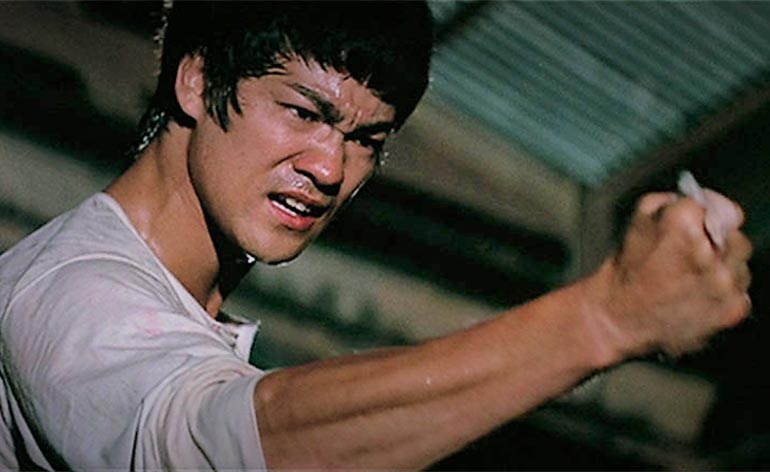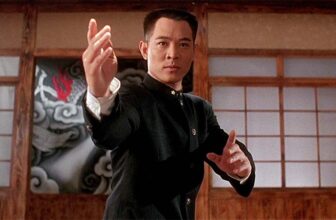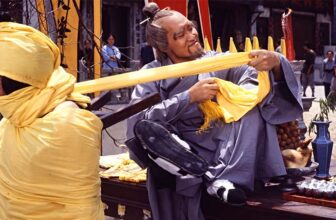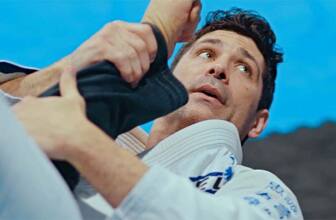
If ever there were proof positive of Bruce Lee’s charisma and the power that emanated from him as if it were pure sunlight, “The Big Boss” is that proof. Were it not for him, “The Big Boss” would most likely have slipped through the cracks of history, but it was precisely because of his face on the poster that it would become the historical classic that it is.
Trailer
Cast
In his first outing as a leading man is the legendary Bruce Lee as the mighty but peaceful kung fu master Cheng Chao-an. Bruce’s frustration with penetrating Hollywood’s cultural barriers in the early 70’s saw him return to his native land, and the release of “The Big Boss” would see him become a god in Hong Kong overnight. James Tien, already well-known in Hong Kong action films, would lend his support as Cheng’s cousin Hsu Chien, while Maria Yi plays another of his cousins, Chiao Mei.
The film’s villainous duties fall to another established martial artist in Hong Kong films, Tony Liu as the vicious Hsiao Chiun, while the titular Big Boss Hsiao Mi is portrayed by Yien Chieh-han, who also served as the film’s fight choreographer.
Plot
Cheng Chao-an travels from his native China to live with his extended family who are part of the Chinese community in Pak Chong, Thailand. Cheng takes a job at an ice factory alongside his cousins, where he is smacked across the face on his first day by the foreman after breaking an ice block. Cheng manages to keep his composure despite this and the frequent gang violence in town by adhering to the promise he’d made to his late mother to refrain from fighting.
Two of Cheng’s cousins inexplicably vanish after being summoned to the manager’s office, and Cheng, his cousins, and the rest of the factory’s workers grow increasingly frustrated with the lack of answers from the business’ upper management. The tensions at the factory eventually spark a riot that Cheng single-handedly quells after finally becoming too furious to honour his mother’s promise, and he is appointed the new foreman of the factory to appease the workers.
What Cheng and the factory workers don’t know is that their missing cousins have been murdered by their upper management after discovering that the factory is actually a front for a drug ring.
Action
Taken at face value, there’s little, if anything, remarkable about “The Big Boss” when Bruce Lee’s involvement is taken out of the equation. His promise to avoid fighting keeps him on the sidelines for the first forty-five minutes of the film, bringing the extremely crude nature of the film into sharp focus for the viewer.
Produced for a near non-existent budget, the film has the raw cinematography typical of 70’s Hong Kong films, and theme music dominated by a trumpet that sounds like the changing voice of a 13-year old boy. If you watch the version that was released in the English-speaking world, the English dub would be good for a night of “Mystery Science Theater”-type hilarity all by itself (although “Black Mask” still holds the trophy for the All-Time Most Obnoxious English-language Dub Ever.)
In essence, “The Big Boss”, like the average Godzilla movie of the same era, demands a willingness to eat a LOT of cheese from the viewer. However, all of these quirks that could easily have felled the film are absolutely powerless against Bruce Lee’s charisma, screen presence, and martial arts ability, and indeed, all three start to look almost radioactive when contrasted against the rest of the film. Because he was already well-known to Hong Kong audiences, holding off on Bruce’s participation in the film’s action scenes was a stroke of genius by the filmmakers.
The audience would see his struggle to honour his vow of non-violence contrasted against the anger boiling inside of him at the disappearance of his loved ones, culminating in a volcanic rage where he could no longer sit on the bench. In typical Bruce Lee fashion, he resembles a cobra poised to strike once he springs into action, and it’s all his enemies can do to work up enough courage to just get within arm’s length of him.
You can almost hear the cries of “ooooh” from four decades ago when one fellow slowly approaches Cheng with a knife, only for Cheng to kick both the knife and his opponent’s face quite literally in the blink of an eye. From the moment he steps into combat, Bruce’s movements in action are crisp and polished in a way totally at odds with the ultra-low budget, exploitative nature of the film he’s in.
Most of the film actually pits Cheng against groups of opponents, and no mob of attackers is large enough to stand a chance against him. One of larger fights in the film sees Cheng take on about two dozen men single-handedly in the ice factory after uncovering the truth of his cousin’s disappearance. It’s here where the film becomes its most gruesome – when Cheng drives daggers in the heads and torsos of his enemies, and the resulting spurts of blood are just about enough to qualify the film as a kind of proto-“Kill Bill”.
But the film also isn’t averse to adding a little over-the-top silliness to the action either, be it in the form of eight foot leaps Cheng makes over the heads of his opponents or the “Looney Tunes”-inspired moment when he punches one enemy through a wall with such power that it leaves a perfect outline of his body in the wall! Mi’s henchmen meet just about the same fate as Cheng’s previous set of opponents when he arrives on the arch-villain’s lawn, ploughing through them like a bulldozer to get to the Big Boss at the top.
The end duel between Cheng and Mi, the only significant one-on-one match in the film, has perhaps some of the best build-up of any climactic fight ever filmed as the two men stare each other down like two gunslingers in the Wild West for over a minute as the music progressively intensifies. All that’s missing is a tumble weed bouncing across the screen…Bruce and his opponent Yien Chieh-han do not disappoint in the slightest – their showdown is filled with such money shots as Cheng lifting Mi’s entirely body over his head and tossing him across the yard like a beach ball and both men leaping ten feet in the air for Cheng’s foot to slam right into Mi’s face, cleverly foreshadowing a similar moment in the climactic duel of “Enter the Dragon”.
Summary
Everything in “The Big Boss” aside from Bruce Lee is completely trivial to enjoying the film. The plot is nothing special, the English dub is sub-par even for the time, and Cheng’s female cousin Chiao Mei is more of a deadweight damsel-in-distress than Olive Oyl ever was. Bruce Lee is the meat and potatoes of “The Big Boss”, and few men could ever hope to pull off a one man show one-one hundredth as well as he did!
Trivia
- “The Big Boss” is the only film with Bruce Lee in the leading role in which he doesn’t use his trademark weapon, the nunchuku.
- When “The Big Boss” and “Fist of Fury” were released in the U.S., they were meant to carry the new titles of “The Chinese Connection” (intended to capitalize on the popularity of “The French Connection”, which also dealt in drug trafficking) and “Fists of Fury”. However, the titles were accidentally switched, and “The Big Boss” ended up being released as “Fists of Fury” while “Fist of Fury” was released as “The Chinese Connection”.
- Upon its release in 1971, “The Big Boss” became the most successful film ever released in Hong Kong at the time.
Film rating: 8/10







Great review!
We’re linking to your article for Bruce Lee Tuesday at SeminalCinemaOutfit.com
Keep up the good work!
[…] excerpt from the review at Kung Fu […]
The Big Boss is my personal favourite Bruce Lee film for a number of reasons. Though it was made on a shoestring and has a plotline thin as a digestive biscuit, it’s raw, vicious and gutsy, especially once Bruce’s character unleashes his animalistic rage. The arduous conditions Bruce had to endure during filming, both physically and mentally, is testament to his warrior spirit. His sheer persistence and unshakable self-belief during the making of this film proved to everyone that he was something pretty special. Well done, Brad, for a nicely presented review.